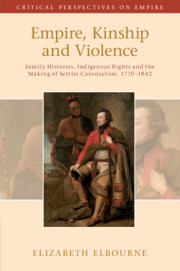 Empire, Kinship and Violence
Empire, Kinship and Violence Kinship, Violence and the Colonial State
Published online by Cambridge University Press: 15 December 2022
The introduction traces the main arguments of the book and provides an overview of key events discussed. It begins with the Sullivan Campaign of the American Revolution. This campaign ethnically cleansed Haudenosaunee people from territory that would later be ceded by the British to the Americans after the Revolution. The chapter asks what this campaign can tell us about the larger history of Indigenous–settler relationships. Among other things, it takes the campaign as an example of the rejection of real and fictive kinship ties between Indigenous peoples and settlers that was, I argue, a necessary precursor to the creation of settler nations. At the same time, some prominent imperial policy makers would struggle, as the book to come will also argue, to maintain different conceptions of Indigenous–imperial kinship in an effort to create a manageable and moral colonialism. The introduction outlines the book’s methodology of using microcosmic analyses to illuminate a macroscopic process: the project of British settler colonialism as it sprawled across time and space during this critical period of the creation and consolidation of settler colonial states. It gives an overview of pertinent scholarship and describes the topics of chapters to come.
To save this book to your Kindle, first ensure no-reply@cambridge.org is added to your Approved Personal Document E-mail List under your Personal Document Settings on the Manage Your Content and Devices page of your Amazon account. Then enter the ‘name’ part of your Kindle email address below. Find out more about saving to your Kindle.
Note you can select to save to either the @free.kindle.com or @kindle.com variations. ‘@free.kindle.com’ emails are free but can only be saved to your device when it is connected to wi-fi. ‘@kindle.com’ emails can be delivered even when you are not connected to wi-fi, but note that service fees apply.
Find out more about the Kindle Personal Document Service.
To save content items to your account, please confirm that you agree to abide by our usage policies. If this is the first time you use this feature, you will be asked to authorise Cambridge Core to connect with your account. Find out more about saving content to Dropbox.
To save content items to your account, please confirm that you agree to abide by our usage policies. If this is the first time you use this feature, you will be asked to authorise Cambridge Core to connect with your account. Find out more about saving content to Google Drive.